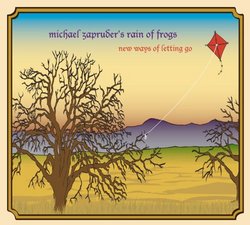Sonice Feast
Rachel Ehlers | 02/07/2007
(5 out of 5 stars)
"I was blown away by the cornucopia of sound offered by New Ways of Letting Go. While I found the lyrics challenging and at times obscure, what has kept me coming back to this album are Zapruder's varied and multi-textured arrangements. "Craftsmanship" is the word that springs to mind when I listen to the lovely interplay of melody and harmony and the rich instrumentation on each track. Zapruder does a wonderful job of creating tunes that are accessible and hummable without being trite.
"
One of maybe 5 important records in 2006
Missus Dalloway | 11/17/2006
(5 out of 5 stars)
"It is a very mysterious record, that raises maybe the most interesting question in art -- why this? Yes, there is a text, and yes there is a meaning behind the text, but where almost all art obsesses over its covert secrets, this record pretty plainly negates that fetish. Instead, it constantly forces you to return to the question what nerves, what circuits, direct the expression of this covert idea into this particular form.
Let me see if I can speak more plainly. A great record has a surface text, like the text of a dream, but thru that surface we glimpse the artist, the personae, and by extension the human condition as we would have it. This is the fetish of art -- the personal, the authentic, not pristinely presented -- that would be autobiography -- but masked and presented in metaphor and resonance. When you look at it, this is really not very interesting, this central fantasy of art (and music in particular). It's no more interesting than discovering that the rat in your dream is a symbol of your worry about money, or whatever. What IS interesting is, why the rat? Why, in the infinite possibilities of your dreams, does the rat become the form?
What makes this interesting is that, as we trace the flow, we feel the resonance of the thing I can't name. There is something going on, something present and vast and right in front of our noses, but we can't sing about it, and we can't even sing metaphors about it. This thing is what mediates between the song and its meaning. "Between" is not right. It is in front of the meaning, in front of the song. It sparks, or forms an arc with the meaning, and carrier of that spark is the song. I'm doing a terrible job of speaking plainly.
Ok. Reduce this record to the lyrics, which are the least important part but are easiest to talk about. The record is largely, on the level of text, about mental illness and institutionalization. There is another text we can unmask, I want to say it's about the beauty of rotting, of getting older, of having time close down, of having loss. (Remarkably, whatever the secret text is, it's definitely not "Michael Zapruder is a sensitive guy who women desire and men want to be like." This distinguishes it from almost every record of its kind. But that's only a means to the end, I think.) Well, what's the nexus? Why this form? This is the question this record forces us to look at, and there isn't an answer, not a rational answer. The nexus is the points of connection, this thing that I refuse to name.
In part, this could, of course, be said of any record -- there's always a text, a secret behind the text, and this nexus. What's remarkable about this record is that it forces us, painfully sometimes, to reject the text, to reject the secret behind the text, and leaves us only with these nerves.
Let's say entertainment is a form that reinforces the fantasies that are necessary for our function. This record is not entertainment. It negates these fantasies, it draws you in but turns on you. I sometimes think it's the most disturbing piece of music I've ever heard. It doesn't allow the ironic distance of 'experimental' music, but it's relentless in negating the fantasies, even the artist-as-artist fantasy, that we rely on and maybe require.
I've probably overstated my case. The record's a lot of things, and really this is just part of it. But, for me, a really fascinating part, and a part that makes me nervous everytime I listen to it. Which can only be good . . .
"

![header=[] body=[This CD is available to be requested as disc only.]](/images/attributes/disc.png?v=15401716)
![header=[] body=[This CD is available to be requested with the disc and back insert.]](/images/attributes/disc_back.png?v=15401716)
![header=[] body=[This CD is available to be requested with the disc and front insert.]](/images/attributes/disc_front.png?v=15401716)
![header=[] body=[This CD is available to be requested with the disc, front and back inserts.]](/images/attributes/disc_front_back.png?v=15401716)

 Track Listings (11) - Disc #1
Track Listings (11) - Disc #1